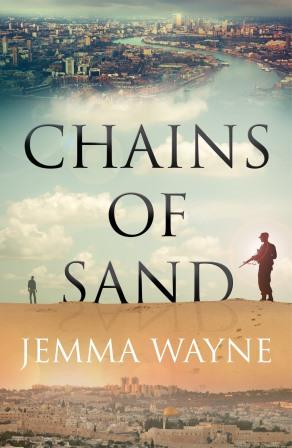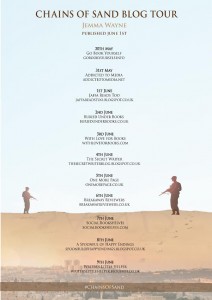
‘Chains of Sand’ opens with a girl trapped in the rubble of her house.
This perfectly constructed chapter illustrates the key themes of the book in slightly less than two full pages: loyalty, fear, peace, conflict, violence, feminism, extremism, the quest for knowledge, and the senseless brutality of every life lost. This girl, we will later learn, is Farah. She is a young girl trapped by a culture which requires her to obey and a father with a heartfelt quest. She is at once intensely symbolic of the young trapped in conflicted regions and deeply, vitally individual, providing one of many threads running through this carefully woven tapestry of life.
What’s it about?
Udi, a veteran of the Israeli army, wants a new life in England. Daniel, a Jewish investment banker from London, wants to move to Israel. What drives someone to leave their family and country behind? How far does your religion or your nationality determine your identity?
Years earlier, Jewish Dara and Muslim Kaseem begin a love affair, but can it survive against the bleak reality of racism in Israel and the entrenched hatred behind it?
As each story develops, Wayne explores racism, anti-Semitism, the search for truth and the rush to extremism, always balancing the individuals’ yearnings against the harsh realities of their lives and the needs and desires of their families.
What’s it like?
Beautiful. Dark. Tragic. It’s impossible to read Kaseem’s story without empathising with his predicament, feeling his pain, even as he hurts Dara badly. The same is true of all the characters. Wayne paints their motivations, their hopes, dreams and limitations so deftly that we can feel the tug of the invisible barriers holding them back – their cultures, their religions – even while we wish them to be bold, to step forward. And Wayne, having been a journalist, is not naive: stepping forward has its harsh realities.
Daniel is undoubtedly the most interesting character. Dara is merely young and romantic; Kaseem perhaps playing a role he has heard others play; the end of their story is sad but ultimately familiar and predictable. Udi’s desire to leave Israel is more understandable than Daniel’s desire to move into a war zone – for the contemporary historical timeframe is the 2014 Israel-Gaza conflict and there is a good chance he will be summoned into battle.
Daniel’s voice enters the novel abruptly – ‘I don’t know’, he begins, the only character given direct access to the reader through a first-person narrative, and he really doesn’t know. Why isn’t his life in London enough for him? Why does he yearn to live in a country almost synonymous with turmoil? He is a modern Jew who keeps kosher but can’t explain why and assumes his attraction to good friend Safia cannot develop since she is a Muslim and would naturally want to marry a Muslim man. His refusal to really try to understand his own ideas and motivations is a source of great frustration to Safia and to his sister, Gaby, both of whom grapple with their sense of identity and the extent to which their religion is a part of them. I love that Wayne has Daniel drawn to Orli, who he seems to see as a simpler, easier choice and ‘fit’ with his blurry concept of self, but the final chapters of the book suggest that she may ultimately challenge him more than Safia…
Final thoughts
This is a moving story which encourages readers to examine the dangers of adopting a simplistic ‘us and them’ narrative in which the Other becomes the Enemy. Wayne’s men are easily polarised and mobilised to fight for an unexamined ideal. Her women sift the truth, searching for a way forward that involves recogition of complexity and shades of grey. They suffer, but continue trying to learn and spread truth. The men, being so closed to shades of grey, learn nothing. Udi endures a loss that he fails to attribute to a cultural misunderstanding, persisting instead in laying the whole blame on another’s shoulders. This, Wayne suggests, is how conflict continues, and I concluded this book wishing that more women were in positions of power in Israel and Gaza!
This is a beautifully written tale where the smallest details work to support the whole and it inspired me to go away and read up about the 2014 Arab-Israeli conflict. I shall certainly be hunting out the author’s previous novel, ‘After Before’, which was longlisted for the Bailey’s Women’s Prize for Fiction and the Guardian’s Not the Booker Prize, and shortlisted for the Waverton Good Read Award.
Want to know more about Jemma Wayne or ‘Chains of Sand’? Then you can visit her website or check out some of the other stops on the blog tour.

